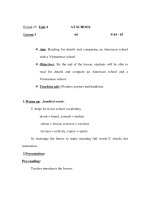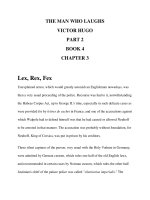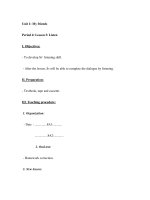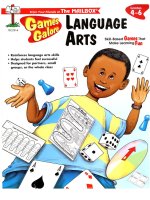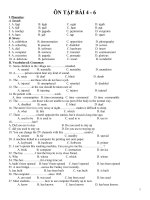4 6 3 julias new home
Bạn đang xem bản rút gọn của tài liệu. Xem và tải ngay bản đầy đủ của tài liệu tại đây (4.4 MB, 14 trang )
Suggested levels for Guided Reading, DRA,™
Lexile,® and Reading Recovery™ are provided
in the Pearson Scott Foresman Leveling Guide.
Genre
Realistic
fiction
Julia’s New
Home
Comprehension
Skills and Strategy
• Theme
• Plot
• Summarize
Scott Foresman Reading Street 4.6.3
ISBN 0-328-13495-3
ì<(sk$m)=bdejfd< +^-Ä-U-Ä-U
by Rena Korb
illustrated by Tim Jones
Reader Response
Julia’s New
Home
1. On page 17, Julia realizes that she has figured
out the secret to living in Santiago. What is the
secret?
2. Summarize the adventures that Julia and her
mother have in Santiago.
3. On page 7, Julia grumbled. Skim the book and list
as many substitutes for said as you can find—such
as announced and exclaimed. What does each of
these words suggest about the speaker’s state of
mind?
4. Give one or more examples of a way that Julia
finds life the same in Santiago as it is back home
in Boston. Give one or more examples of a way
that she finds life different. Use a chart like this
one to organize your responses.
Life in Santiago and Boston
by Rena Korb
illustrated by Tim Jones
Alike
Different
Editorial Offices: Glenview, Illinois • Parsippany, New Jersey • New York, New York
Sales Offices: Needham, Massachusetts • Duluth, Georgia • Glenview, Illinois
Coppell, Texas • Ontario, California • Mesa, Arizona
CONTENTS
CHAPTER 1
The Big Move . . . . . . . . . . . . . . . .4
CHAPTER 2
A Night Out . . . . . . . . . . . . . . . . . .6
CHAPTER 3
Nothing Quite the Same. . . . . . . .9
CHAPTER 4
A Big Chilean Family . . . . . . . . . .13
CHAPTER 5
Exploring the City . . . . . . . . . . . .16
Every effort has been made to secure permission and provide appropriate credit for
photographic material. The publisher deeply regrets any omission and pledges to
correct errors called to its attention in subsequent editions.
Unless otherwise acknowledged, all photographs are the property of Scott Foresman,
a division of Pearson Education.
23 Barnabas Bosshart/CORBIS
ISBN: 0-328-13495-3
CHAPTER 6
A New School Year . . . . . . . . . . .19
Julia’s Spanish List. . . . . . . . . . . .22
The City of Santiago . . . . . . . . . .23
Copyright © Pearson Education, Inc.
All Rights Reserved. Printed in the United States of America. This publication is
protected by Copyright, and permission should be obtained from the publisher
prior to any prohibited reproduction, storage in a retrieval system, or transmission
in any form by any means, electronic, mechanical, photocopying, recording, or
likewise. For information regarding permission(s), write to: Permissions Department,
Scott Foresman, 1900 East Lake Avenue, Glenview, Illinois 60025.
2 3 4 5 6 7 8 9 10 V0G1 14 13 12 11 10 09 08 07 06 05
3
Chapter 1
The Big Move
Julia Miller stood on the balcony of her highrise apartment and stared gloomily at the street
below. Other people might have found the scene
pretty, but not Julia. She had already looked at
the white tips of the Andes, the high mountains
outside of Santiago, and she counted the palm
trees lining the streets several times.
Julia had lived in Santiago, Chile, for just a
week, and she did not like it one bit. She missed
Boston, Massachusetts, where she used to live.
She remembered that terrible day when she
found out they were moving! As soon as Julia
came home from school, she knew something
was wrong. Her father was never home that
early, and her mother looked extremely serious.
Then they told her the devastating news that
they were moving to Santiago, Chile!
Julia’s father had been offered a substantial
new job in a prominent business there. “But
what about your job?” Julia asked her mother.
“I can write books anywhere,” said her
mother, who was herself a noted writer of books
for children. “I can’t imagine anything more
exciting than living in another country!”
Her father noticed Julia’s trembling lips and
put his arm around her comfortingly. “We would
never make this move if we didn’t think you’d
love Chile,” he told her.
4
5
Chapter 2
A Night Out
So far, Julia didn’t love Chile at all! They had
arrived in January. In Chile, the school year ran
from March to December, which meant she
wouldn’t even have the chance to meet anybody
or make new friends for months!
At home it would be winter and she could ski
and ice skate. Here, it was just hot—very hot.
Even her name had changed. In Spanish, there
was no J sound. Instead, it was pronounced like
an H. Now everyone called her “Hulia.” She
barely recognized it herself.
6
One night, Julia’s dad announced he wanted
to take his girls out to dinner. “Yum!” Julia said,
jumping up and raring to go. She hadn’t had a
decent hamburger since they arrived in Chile.
“Better go change,” said Julia’s mother.
“People don’t wear shorts and t-shirts out to
dinner here.”
“They don’t?” asked Julia. She changed into a
dress, but she felt grumpy about it.
It was stiflingly hot outside, but her mother
had been right. Julia noticed that no one, not
even the smallest kids, was wearing shorts.
“Boy, if I have to wear long pants or dresses
every time we leave the house, this is going to be
a long summer!” she grumbled to herself.
They took an elevator to the top floor of a
tall building. As soon as they got out, a hostess
greeted them in Spanish, “Buenas noches.” Julia
did not speak Spanish, but her parents did.
”She said, ‘Good evening,’” Julia’s mother told
her.
Julia picked up the menu. “Well, this was a
mistake,” she thought. Aloud she said, “I don’t
understand it!”
7
Julia’s parents helped her. There were so many
new foods. Humitas were corn kernels mixed
with onions and spices and then wrapped and
baked in corn husks. “I bet you’d love pastel de
papas. It’s just like shepherd’s pie,” suggested
Julia’s father.
Julia’s parents sampled several traditional
Chilean treats. “Es rico!” Julia’s mom exclaimed,
biting into an empanada. “That means it’s
delicious. It’s just ground meat, olives, and some
spices—rather like a hamburger wrapped in
dough.”
8
Chapter 3
Nothing Quite the Same
The next day Julia’s mom took her on a walk.
The people walking by spoke a constant stream
of Spanish, but Julia, of course, had no idea what
they were saying.
Julia tried to explain to her mother how
she felt. “It looks sort of like Boston,” she said.
“There are cars and stores, but nothing is quite
the same—and I haven’t seen a single hamburger
place yet!”
9
After their snack, they stopped to watch
some kids playing soccer. One boy was playing
by himself, kicking the ball and bouncing it off
his knee. Then he bounced it off his head! “He’s
really a great player,” Julia said.
The boy saw her watching. “¿Le gusta el
fútbol?” he asked with a smile. When Julia did
not answer, the boy repeated his question. This
time Julia made out the word football. However,
all she could say was “No hablo español,” which
meant “I don’t speak Spanish.” How could she be
expected to make friends if she couldn’t speak
the language?
“Why don’t we get a snack?” her mom
suggested. They stopped at a café, where Julia’s
mom got a soft drink, and Julia picked out a
cookie. “You want to pay?” Julia’s mom said,
handing her a bill.
Julia stared at the money in her hand. Along
the bottom she read “Cinco mil pesos” and in the
corner it said 5,000. She was holding 5,000 pesos.
“So much money!” she exclaimed.
“Not really,” Julia’s mother laughed. “Five
thousand pesos is only a bit more than eight
dollars.” Julia’s mother sighed. “There is one
thing I don’t like about Chile. They often don’t
have the kind of coffee I like.”
Julia realized that, like herself, her mom
missed some things about life back home.
Knowing that made her feel a little less alone.
10
11
Julia’s mother worked at her computer the
next day, typing up notes for a new children’s
book she was going to write. Julia turned on
the television to fill up the silent apartment.
She immediately spotted one of her favorite
television programs, but the actors and actresses
had been dubbed and spoke in Spanish!
Julia turned to a show she remembered seeing
and found she could figure out some of the
words. To her surprise, she even understood a bit
of what they were saying.
All that afternoon, Julia watched Spanish
shows. She especially loved variety shows. On a
whim, she started writing down some Spanish
words. Then she found she was adding to her list.
Could it be she was learning Spanish by watching
TV? Imagine that!
Chapter 4
A Big Chilean Family
One day, Julia and her family were invited
to dinner at the house of her father’s boss. His
name was Eduardo Ruiz García.
Julia’s mother laid out a skirt for her. “I hate
wearing a skirt,” Julia muttered, but she put
it on without a fight. She even made sure her
fingernails were clean without being told.
After a short drive, the Millers pulled up in
front of a quaint, old home, covered with stucco
and inset with colorful tiles. Julia followed her
parents to the door, holding a box of candy to
give to their hosts. Julia’s mother murmured,
“Don’t be surprised if Daddy’s boss has a big
family. Many generations in Chile often live
under the same roof.”
(For Julia’s list of Spanish words and phrases, see page 22.)
12
13
Julia’s mother was right! Julia met her hostess,
Señora Rojas, and the señora’s mother, Doña
Eva. She also met an uncle, a married son and his
wife, and three teenage children.
Then she met her father’s boss. “I am Señor
Ruiz,” he said.
“But I thought your last name was Ruiz
García!” Julia exclaimed. “What happened to the
rest of your last name?”
Everyone in the room laughed. For a moment,
Julia felt embarrassed. “Most people in Chile
have two last names,” he said. “One from their
mother and one from their father. People usually
use only their father’s name in day-to-day life.”
The dinner table was covered with traditional
Chilean treats. There was a salad of chopped
onions and tomatoes, a meat casserole called
pastel de choclo, and a special pumpkin
stew. Julia recognized a plate piled high with
empanadas.
Remembering how her mother had enjoyed
them at the restaurant, Julia took a small,
tentative bite. Her mother was right! They were
delicious. She wrinkled her forehead, trying to
think what her mother had said. “Es rico!” she
told the table. The whole family responded with
smiles and nods.
14
15
Chapter 5
Exploring the City
Over the next month, Julia and her mother
continued to explore the city. One day they
found a crafts fair, where women dressed in
colorful costumes sold silver jewelry and many
lovely hand-crafted household items. There were
also traditional crafts made by the Mapuche
Indians. After looking carefully, they chose a
silver headband for Julia.
Other days they took the subway to the center
of Santiago to visit the city’s many museums.
Julia particularly liked the history museum.
One weekend, Julia’s dad came with them to
the rodeo, which was called la fiesta huaso. “You
two are having so much fun exploring, I want to
explore too!” he said.
Julia loved the exciting rodeo. She thought
that huasos looked a little bit like American
cowboys. Instead of big tan cowboy hats,
though, the huasos wore flat-brimmed hats
made of felt. Instead of cowboy shirts, they wore
colorful mantas, which were like ponchos, only
shorter.
“I think there’s a secret to living here,” Julia
told her parents. “Santiago is like Boston. But
different!” Her parents laughed.
Julia loved walking around the city. She always
saw something new. There were the modern
video arcades called flippers, and Julia loved the
post office that was in an old colonial palace.
Another day, when they were walking, they
recognized Señor Ruiz’s wife, Señora Rojas!
“Son los Millers!” Señora Rojas called out with
a wave. Julia’s mother stopped, and the two
women talked for a few minutes in Spanish. To
Julia’s surprise, she realized she could make out a
word here and there.
16
17
The rodeo was so thrilling. Julia watched
with excitement as teams of riders chased a bull
around the ring. They used their horses to nudge
the bull to a stop along the railing. If they hit
that spot, they’d get more points.
After the teams competed and the judges
awarded trophies, the huasos took turns dancing
with the queen of the rodeo.
“That was fun, wasn’t it?” Julia mumbled
sleepily on the ride home.
18
Chapter 6
A New School Year
It was finally time! School would start in two
more weeks, and Julia was both excited and
nervous.
She looked at the school supplies she and her
mother had bought. There were shiny new pens
and smooth notebooks. “I hope these are good
choices,” Julia said. “I want to fit in—you know,
like everyone else.”
“Well, at least you’ll look like everyone else,”
her mom said. “Remember that school uniform!”
Julia groaned aloud. At her school, everyone
had to wear a uniform. Her uniform was a boring
gray skirt, white blouse, and red necktie.
19
Later that day, they went for a walk.
Outside Señora Rojas’s house stood Doña Eva,
accompanied by a girl who looked just about
Julia’s age. “Buenos días!” Senora Rojas called
out eagerly. She greeted Julia’s mother by kissing
her on both cheeks and smiled warmly at Julia.
Then she introduced the girl “Ésta es mi
sobrina. Se llama Isabel.”
“She’s Da Eva’s niece,” her mother
explained to Julia.
“Buenos días, Isabel,” Julia said. “Me llamo
Julia.” That was another sentence she had
learned. It means, “Hello, Isabel. My name is
Julia.”
20
“Me gusta tu camisa,” Isabel said.
Julia looked down at her brand-new bright
red shirt. “Muchas gracias,” she answered. Only
then did she realize that something amazing had
just happened. She had understood Spanish!
Julia and Isabel spent the rest of the afternoon
together. Julia could not understand everything
Isabel said, but the girls also used gestures.
At the end of the day, Julia was sad to leave.
That’s when Mrs. Miller told her the news. “You
girls are going to the same school.” Then she
translated so Isabel could understand.
“Cool!” the new friends exclaimed at exactly
the same time.
21
Julia’s Spanish List
banco nacional
buenas noches
buenos días
churros
cinco mil
empanada
Es rico.
Ésta es mi sobrina.
hoy
huasos
humitas
la fiesta huaso
Le gusta el fútbol.
mantas
Me gusta tu camisa.
Muchas gracias.
No hablo español.
pastel de choclo
pastel de papas
pescado fresco
peso
Se llama Isabel.
Son los Millers.
tarjetas de crédito
22
national bank
good evening
good day
fritters
five thousand
ground meat wrapped
in dough
It’s delicious.
This is my niece.
today
cowboys
corn baked in corn husks
rodeo
She/he likes soccer.
short capes, like ponchos
I like your shirt.
Thank you very much.
I don’t speak Spanish.
meat casserole
shepherd’s pie
fresh fish
unit of money, like the
American dollar
Her name is Isabel.
It’s the Miller family.
credit cards
The City of Santiago
In 1541 a Spanish explorer named Pedro de
Valdivia built a new city along the Mapocho
River. He named the settlement Santiago. The
surrounding land was called Chile. For nearly 300
years, the land was ruled by Spanish governors.
By the early 1800s, the people of Chile wanted
to be free from Spain. Between 1810 and 1818,
Chileans fought the War of Independence. After
the victory, Santiago became the new capital of
the country of Chile.
Today, Santiago is a modern, exciting city with
a population of more than six million. Santiago
has a subway system, several airports, many
banks and businesses, and a stock exchange.
The city also is rich in culture. Chileans and
tourists alike enjoy visiting the city’s museums,
sightseeing among the old Spanish buildings, or
simply relaxing in the beautiful parks.
23
Reader Response
1. On page 17, Julia realizes that she has figured
out the secret to living in Santiago. What is the
secret?
2. Summarize the adventures that Julia and her
mother have in Santiago.
3. On page 7, Julia grumbled. Skim the book and list
as many substitutes for said as you can find—such
as announced and exclaimed. What does each of
these words suggest about the speaker’s state of
mind?
4. Give one or more examples of a way that Julia
finds life the same in Santiago as it is back home
in Boston. Give one or more examples of a way
that she finds life different. Use a chart like this
one to organize your responses.
Life in Santiago and Boston
Alike
Different

